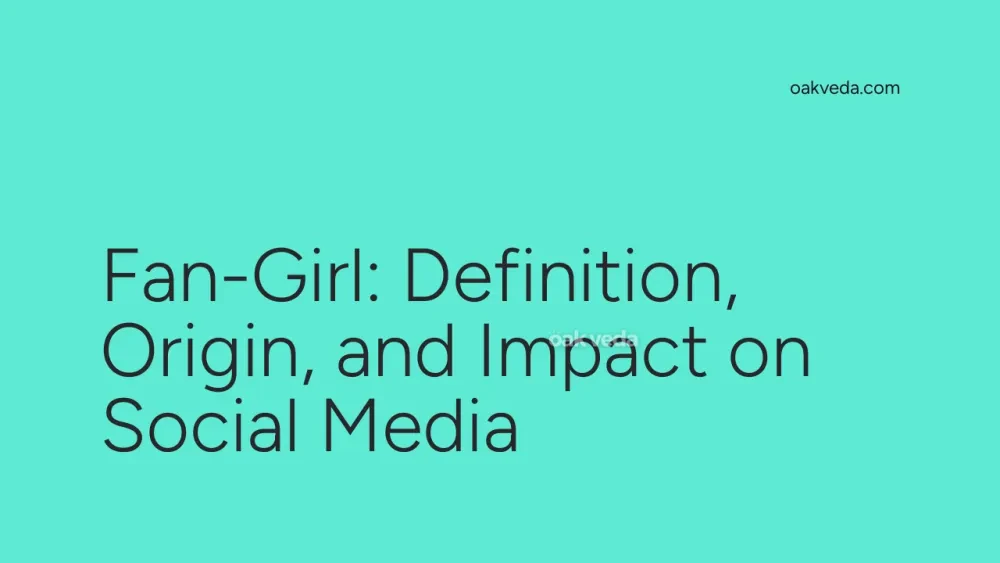
What is a Fan-Girl?
A fan-girl is an enthusiastic and dedicated female fan, typically associated with passionate admiration for celebrities, fictional characters, TV shows, movies, book series, or music groups. The term combines "fan" and "girl," often used affectionately to describe someone who exhibits intense admiration for a specific subject. While traditionally referring to young female fans, the term has evolved to encompass people of all genders who display fervent enthusiasm for their interests.
Origin and Development of Fan-Girl Culture
The concept of fan-girls has been around for decades, with roots tracing back to the rise of pop culture in the mid-20th century. However, the term gained significant traction with the advent of the internet and social media platforms. These digital spaces provided fan-girls with unprecedented opportunities to connect, share, and express their passion.
As social media platforms like Tumblr, Twitter (now X), and Instagram gained popularity, fan-girl culture flourished. These platforms allowed fans to create and share content, form communities, and interact with like-minded individuals across the globe.
How Fan-Girl Culture Works on Social Media
On social media, fan-girls engage in various activities to express their fandom:
- Content Creation: Fan-girls produce fan art, fan fiction, edits, and memes related to their interests.
- Community Building: They form and participate in online communities dedicated to their fandoms.
- Information Sharing: Fan-girls often act as unofficial news sources, sharing updates about their favorite celebrities or franchises.
- Trend Setting: They frequently initiate and participate in trending topics or hashtags related to their interests.
- Engagement: Fan-girls actively engage with official accounts of celebrities, brands, or franchises they admire.
Types of Fan-Girl Expression on Social Media
Fan-girl expression on social media can take various forms:
- Visual Content: Fan art, edits, and cosplay photos shared on platforms like Instagram and TikTok.
- Written Content: Fan fiction published on sites like Archive of Our Own (AO3) or Wattpad, often promoted through social media.
- Video Content: Reaction videos, cover songs, or fan theories shared on YouTube or TikTok.
- Discussion Forums: Dedicated subreddits or Facebook groups for in-depth fandom discussions.
- Live-Tweeting: Real-time commentary during events or show airings, often using official hashtags.
Popular Examples of Fan-Girl Culture on Social Media
- BTS Army: The dedicated fandom of K-pop group BTS, known for their organized social media campaigns and charity initiatives.
- Potterheads: Harry Potter fans who continue to engage with the franchise through social media, fan theories, and fan-created content.
- Marvel Cinematic Universe (MCU) Fans: Known for their extensive theories and discussions about upcoming films and TV shows.
- Taylor Swift's Swifties: Renowned for decoding hidden messages in Swift's music and social media posts.
Impact of Fan-Girl Culture on Social Media
Fan-girl culture has significantly influenced social media and broader digital culture:
- Driving Engagement: Fan-girls often boost engagement rates for celebrities and brands they support.
- Influencing Marketing Strategies: Companies now tailor their social media strategies to harness the power of fan communities.
- Shaping Pop Culture: Fan theories and discussions can influence the direction of TV shows, movies, and even celebrity behavior.
- Creating Micro-Economies: Fan-created content has led to new economic opportunities, such as commission-based fan art or popular fan fiction becoming published books.
Controversies Surrounding Fan-Girl Culture
While largely positive, fan-girl culture has faced some criticisms:
- Stereotyping: The term "fan-girl" has sometimes been used dismissively, implying immaturity or obsession.
- Toxicity: Some fan communities have been accused of engaging in online harassment or excessive gatekeeping.
- Privacy Concerns: Overzealous fans may sometimes cross boundaries in their pursuit of information about celebrities.
How Brands and Influencers Leverage Fan-Girl Culture
Savvy brands and influencers have recognized the power of fan-girl culture:
- Exclusive Content: Offering behind-the-scenes glimpses or early access to content for dedicated fans.
- Fan Engagement: Directly interacting with fans through Q&A sessions, live streams, or responding to comments.
- Co-Creation: Involving fans in product development or creative processes.
- Community Building: Fostering a sense of belonging among fans through dedicated hashtags or online events.
Future Trends in Fan-Girl Culture
As social media continues to evolve, fan-girl culture is likely to adapt:
- Virtual Reality (VR) Experiences: Immersive fan experiences in virtual spaces.
- Blockchain and NFTs: Potential for unique, verifiable digital collectibles for fans.
- AI-Powered Interactions: More sophisticated chatbots or AI representations of celebrities for fan engagement.
- Cross-Platform Integration: Seamless fan experiences across multiple social media platforms and technologies.
FAQs about Fan-Girl Culture
-
Is being a fan-girl only for young people? No, people of all ages can be fan-girls. The term is more about enthusiasm than age.
-
Can men be fan-girls? Yes, the term has evolved to be more inclusive and can apply to anyone regardless of gender.
-
Is fan-girl culture the same as stan culture? While similar, stan culture is often associated with more extreme or obsessive fan behavior.
-
How do I start engaging in fan-girl culture on social media? Start by following official accounts, joining fan communities, and participating in discussions or content creation related to your interests.
-
Can fan-girl culture be harmful? While generally positive, it's important to maintain a healthy balance and respect boundaries in fan activities.
Fan-girl culture has become an integral part of social media, shaping how we interact with content, celebrities, and fellow fans. As digital platforms continue to evolve, the expression and impact of fan-girl culture will undoubtedly adapt, maintaining its significant influence on online communities and popular culture at large.
You may be interested in:
- Shook: Definition, Origin, and Impact on Social Media
- Marketing Proposal: Definition, Origin, and Impact
- Deinfluencing: Definition, Origin, and Impact on Social Media
- Face Card: Definition, Origin, and Impact on Social Media
- A/B Testing: Definition, Origin, and Impact on Social Media
- TBT: Definition, Origin, and Impact on Social Media Culture

